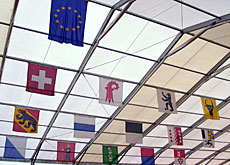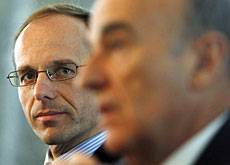Cantons hold key in EC business tax row

Swiss cantons say the latest European Commission attack on Swiss corporate tax breaks will fail without a referendum to end the cantons' financial independence.
Cantons are free to set their own tax rates under the Swiss constitution and they told swissinfo they would ignore renewed demands from the Commission to end “unfair” privileges.
The Commission on Tuesday accused non-EU member Switzerland of violating the 1972 Free Trade Agreement by allowing individual cantons to set low tax rates to tempt foreign companies to relocate.
In essence, the Commission argues that firms are being unfairly poached, thus depriving member states of valuable sources of tax revenue.
The report was presented to the Swiss federal authorities, but central government would be powerless to make the cantons cooperate even if ministers changed their position of defending the system.
“The Commission clearly does not understand our political system. The federal authorities have no say in this matter,” Kurt Stalder, secretary of the Conference of Cantonal Finance Directors, told swissinfo ahead of the EC report.
“It is written into our laws that cantons set their own taxes and there must be a national referendum to change this. The people have had numerous invitations to make a change in the last few years but they have always voted to accept the system.”
Stalder added that the 26 cantonal finance heads had voiced a unanimous resolution to resist pressure from Europe during a recent meeting of the Commission.
United front
Canton Zug finance director Peter Hegglin could not understand why the Commission has decided to launch its challenge now.
“The holding company taxation system criticised by the European Commission has existed in individual cantons for over 50 years. We should not allow ourselves to be intimidated,” he told the Tages-Anzeiger newspaper.
The Swiss Tax Harmonisation Act, introduced in 2001, obliges cantons to define taxable income and lays down what constitutes allowances and deductions, but it leaves the setting of rates to cantons.
The practice of lowering corporate tax rates to attract large company headquarters has also been successfully utilised by Ireland and Cyprus, among others. But Switzerland is a particularly strong magnet because of the high standard of living to be enjoyed in the country.
In the 18 months the dispute has been rumbling, several cantons – notably Obwalden – have reduced levies even further and the world’s second-largest food manufacturer, Kraft, has relocated its European headquarters from London and Vienna to Zurich.
Wealthy individuals
Some cantons have broken ranks in the separate issue of the granting of tax breaks to wealthy individuals.
Zurich in particular is concerned that neighbouring cantons have been attracting rich people who then “freeload” on the nearby city’s services and lifestyle.
However, the disagreements stop when it comes to the Commission’s assault on business tax breaks.
“In this field all the cantonal finance directors have agreed to say ‘no’ to what the Commission is demanding,” Stalder said.
swissinfo, Matthew Allen
Article 23.iii of the 1972 Free Trade Agreement states that: “any public aid which distorts or threatens to distort competition by favouring certain undertakings or the production of certain goods” is “incompatible with the proper functioning of the Agreement”.
The 1972 accord exclusively governs the trading of certain goods (industrial and agricultural processed products).
Switzerland argues that the procedures for taxing management companies, mixed companies and holding companies in the country do not fall within the scope of the 1972 free trade agreement.
Selected cantonal corporate tax rates (federal, cantonal and municipal) from a KPMG report published in November 2006: Obwalden 13.1% of operating income, Schwyz 15.6%, Zug 16.4%, Zurich 21.3%, Graubünden 29.1%. Swiss average 21.3%.
Business tax rates in other countries:
Japan 40.7%, US 40%, Germany 38.3%, Republic of Ireland 12.5%, Cyprus 10%.

In compliance with the JTI standards
More: SWI swissinfo.ch certified by the Journalism Trust Initiative




You can find an overview of ongoing debates with our journalists here. Please join us!
If you want to start a conversation about a topic raised in this article or want to report factual errors, email us at english@swissinfo.ch.